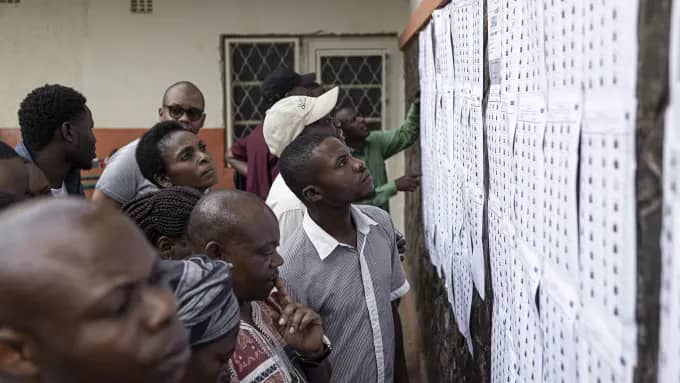
DR Congo Vote Marred by Protest and Delays as Opposition Alleges Fraud
The Democratic Republic of Congo (DRC) found itself in the midst of presidential and legislative elections on Wednesday, marked by a tumultuous campaign tainted with allegations of fraud, electoral violence, and logistical challenges that could potentially disenfranchise a significant number of voters.
The significance of these elections extends beyond determining the next administration’s legitimacy. Historical patterns indicate that election disputes in the DRC often lead to violent unrest, with potential far-reaching consequences.
As the world’s third-largest copper producer and the primary supplier of cobalt, a critical component for the green transition, the stability of the DRC has implications for global industries.Reports of delays surfaced in various towns, particularly in the rebel-affected eastern regions, and even in the capital city, Kinshasa, where voting materials were yet to reach polling stations, and voter lists remained unpublished.
Presidential candidate Martin Fayulu, who finished as the runner-up in the disputed 2018 presidential election, described the situation as “total chaos.” While acknowledging the organized nature of the vote in the upmarket Gombe district, where he cast his vote, he expressed concern about the state of affairs across the rest of the country
“If all the people don’t vote in all the polling stations indicated by the CENI (national election commission), we won’t accept these elections,” Fayulu cautioned, pledging to be at the forefront of any protest.In eastern cities like Goma and Beni, citizens encountered difficulties finding their names on voter lists, which were only provided at polling stations on the morning of the election. In Bunia, security forces resorted to firing warning shots to disperse protesters after a voting center was vandalized.
A provincial election commission official attributed protests in violence-affected areas to displaced individuals desiring to vote in their hometowns.For months, the national election commission in Congo assured a free and fair vote. However, independent observers and critics raised concerns about irregularities that could compromise the results’ legitimacy.Approximately 44 million Congolese citizens are registered to participate in the elections, including regional ballots. Concerns about the commission’s ability to open polling stations in hard-to-reach areas led to authorities seeking additional helicopters.Provisional results are anticipated by December 31.
President Felix Tshisekedi, seeking a second term, faces competition from 18 opposition challengers. Tshisekedi, in his final rally, promised to expand free education if re-elected, while opposition candidates focused on stability, peace, and economic development.
Nobel Peace Prize laureate and opposition candidate Denis Mukwege labeled the ongoing electoral process as the “greatest electoral fraud of the century,” a claim repeatedly rejected by the election commission.
The single-round election requires a simple majority for victory. The lead-up to the vote witnessed election-related violence, including the killing of two parliamentary candidates on December 15, drawing condemnation from human rights groups and the European Union.As election day unfolded in Kinshasa, some locals expressed skepticism about the effectiveness of their vote.
“Every time we vote, we are disappointed, but if I had to vote, it would be for a change,” remarked 43-year-old Lucie Mpiana, who is unemployed.Credit: Reuters
